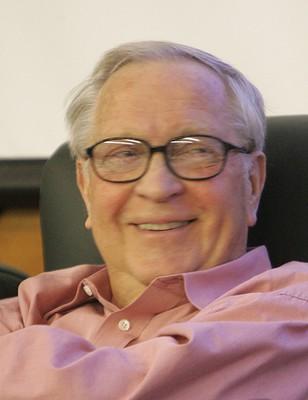He’s a love him or hate him kind of chancellor

If it worked for Tony Soprano, the fictional mob boss who confessed his anxieties to a psychiatrist, then it could work for university system Chancellor Jim Rogers and the Board of Regents.
After interviewing people who work with Rogers the most, an outside consulting firm is recommending counseling for the leaders of the Nevada System of Higher Education.
The system hired Clarity Advisors to Management to conduct interviews in May with some 30 people — regents, college presidents and the higher education system’s executive staff — about what they thought about Rogers.
The results?
“People love him or hate him,” said Clarity Senior Advisor Carl Rowe, who is also director of the Las Vegas Housing Authority. “The shrill of voices, if you will, are so at odds that my answer as a consultant would be to try and do some kind of intervention that would bring those extremes to the center.”
The need for conflict resolution had mixed reactions from regents after the report was released Thursday.
Regent Michael Wixom said he thought an intervention to hash out problems between Rogers and regents would be premature, while Regent Mark Alden said it could be helpful.
“I think it’s good to discuss things, and to do it in the open,” Alden said. “But you don’t want people in there throwing things at each other. If it’s formalized, I think it’s healthy.”
Rowe said an intervention by a third party would be difficult to perform with an elected board, which has to abide by Nevada’s open meeting law when it meets.
Rogers and the board members would first have to agree to meet, and a third party would have to be willing to step in and mediate, Rowe said.
Even then, the parties probably wouldn’t be enthusiastic about commenting publicly about their differences, he said.
Clarity’s report said the most frequently used word by respondents to describe the relationship between Rogers and the Board of Regents was “contentious,” and the only debate seemed to be about just how contentious the relationship is.
Several of the problems between the two groups are fundamental.
• Rogers has expressed publicly that he favors an appointed Board of Regents instead of an elected one, while most of the regents feel otherwise.
• Many people complained in the report that Rogers micromanages each of the eight institutions and delves into issues beyond his role as chancellor, such as his involvement in the Clark County School District’s search for a superintendent last year.
• Several regents disagree with Rogers’ role as a take-charge chancellor who views his position as the leader of the higher education system. Regent Bret Whipple said Rogers is the employee of the 13 regents. That conflict led to Rogers’ brief resignation and return in January.
The comments from people interviewed in Clarity’s report were “decidedly more pointed, even trenchant in their tone,” than last year, the report said.
Comments about Rogers, which were all anonymous, ran the gamut.
“He is a renegade Chancellor!” one person said.
“His outrageousness goes too far,” said another.
Still, to some, “he doesn’t mince words — and I like it!” Another: “It’s going to be hard to replace Jim.”
Rogers said Friday that he didn’t want to comment on the evaluation until it comes up for discussion during next week’s Board of Regents meeting in Reno. Emotions are promised to be high at the meeting, as regents will discuss Rogers’ evaluation and debate his role as chancellor.
They’ll also look at revoking Rogers’ ability to fire institution presidents.
But if leaders of the higher education system decide to hash out their differences, it wouldn’t be the first time.
Outgoing Boyd Law School Dean Richard Morgan and leaders of the school’s Saltman Center for Conflict Resolution met with regents a few years ago to discuss how to deal with conflict.
Morgan said conflict resolution to address specific problems, such as when former Clark County Manager Thom Reilly stepped in to mediate between Rogers and Regent James Dean Leavitt after Rogers resigned in January, can be very helpful.
But Morgan said conflict on an elected board is to be expected.
“The fact that there are tensions is not a bad thing, it’s a good thing. It can prevent people from running amok (with power),” he said. “The problem is when the squabbling is such that you can’t get things done.”












